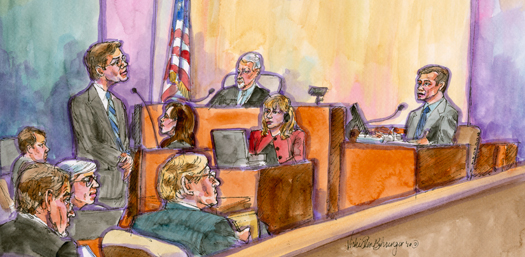Marriage News Blog

On the fourth day of trial, social epidemiologist Ilan Meyer testified about the harm gays and lesbians have experienced because of Proposition 8.
At the time of trial, Meyer was a Professor of Clinical Sociomedical Sciences and Deputy Chair for MPH Programs at the Department of Sociomedical Sciences at Columbia UniversityŌĆÖs Mailman School of Public Health.┬Ā He is now Senior Scholar for Public Policy at the Williams Institute for Sexual Orientation Law and Public Policy at UCLAŌĆÖs School of Law.┬Ā Dr. Meyer is co-editor The Health of Sexual Minorities: Public Health Perspectives on Lesbian, Gay, Bisexual and Transgender Populations, an influential text that offers a multidimensional picture of LGBT health, incorporating contributions from across clinical and social science disciplines.
Watch Jesse Tyler Ferguson reenact Professor Meyer’s testimony during the Los Angeles premiere of ŌĆ£8ŌĆØ the play.
Testimony Highlights
ŌĆ£The first [part of my testimony] is on the nature of stigma. And I will testify to the effect of stigma on gay and lesbian populations with reference to Proposition 8 as an example of a stigma.
ŌĆ£The second part will describe a model of minority stress that is a model that I am credited with authoring, and has been referred to in much of the literature on gay and lesbian health. And I will describe how social stressors affect gay and lesbian populations.
ŌĆ£And the third part describes the effect of those stressors on health, in particular mental health.ŌĆØ
ŌĆ£There are really many stigmas and stereotypes that describe kind of how people are perceived.
ŌĆ£In my work, I have written about the role of intimate relationships and the way intimate relationships have been portrayed.
ŌĆ£And part of the stereotype that is part of the stigma, the negative attitude or the negative associations with this group, has been for many years that gay people are unŌĆöincapable of relationships, of intimate relationships; they may be undesiring, even, of intimate relationships; and that, certainly, they are not successful at having intimate relationships.ŌĆØ
“And when I say this has been a kind of social stigma, I’m talking about how it has been portrayed in various cultural outlets as well as in a more organized way in various social interactions, social institutions.”
ŌĆ£I think it is quite obvious that Proposition 8, by definition, blocks the marriage institution for gay men and lesbians. This is basically what it says. So, in that sense, it certainly will be responsible for gay men and lesbian not marrying, and having to explain why I have not married. And by explaining why I have not married, you also have to explain, I’m really not seen as equal. I’mŌĆömy status isŌĆöis not respected by my state or by my country, by my fellow citizens. So it’sŌĆöin the very basic definition of structural stigma, it is a block on the way to achieving desirable goals in life.ŌĆØ
ŌĆ£Proposition 8, in its social meaning, sends a message that gay relationships are not to be respected; that they are of secondary value, if of any value at all; that they are certainly not equal to those of heterosexuals.
ŌĆ£And, to me, that’sŌĆöin addition to achieving the literal aims of not allowing gay people to marry, it also sends a strong message about the values of the state; in this case, the Constitution itself. And it sends a message that would, in my mind, encourage or at least is consistent with holding prejudicial attitudes.
ŌĆ£So that doesn’t add up to a very welcoming environment.ŌĆØ
“Sexual orientation is ‘a core thing about who you are, this is how people talk about: This is who I am.’
ŌĆ£That doesn’t mean that gay people are just that. But it is a central identity that is important. And if you want to express who you are, certainly, you wouldn’t want to hide that part.ŌĆØ
